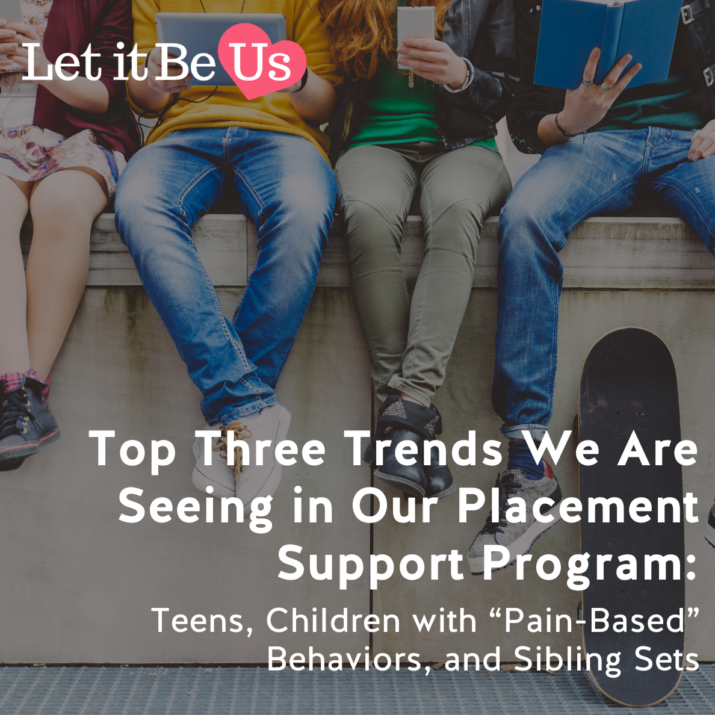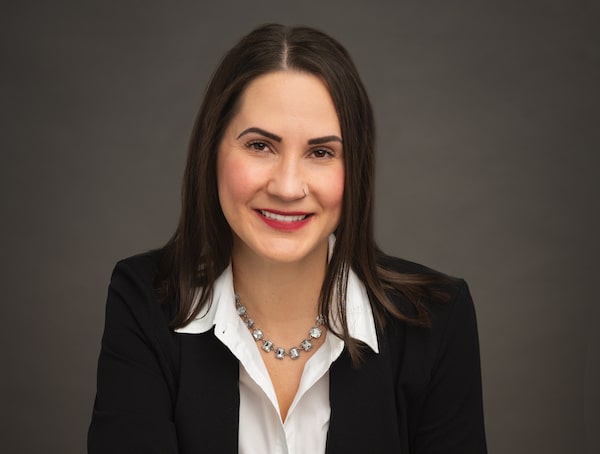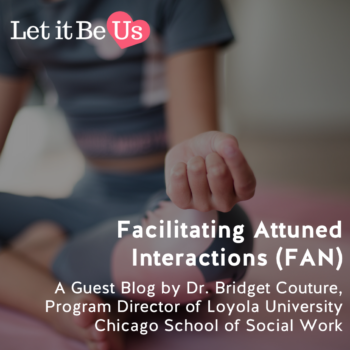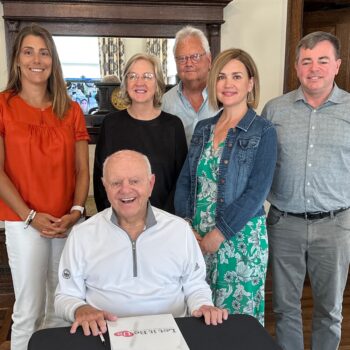Top Three Trends We Are Seeing in Our Placement Support Program: Teens, Children with “Pain-Based” Behaviors, and Sibling Sets
- Foster Care
- May 30, 2023

Let It Be Us is proud to help support caseworkers and other child welfare professionals seeking home options for children in foster care. The children referred to our unique placement support program are most often children in a placement crisis. This means the case management team finds themselves without a home for a child, having exhausted all of their own options within their agency or DCFS office. Without a home, this means our children end up in shelters or sleeping for days (or weeks) at an agency office.
We know in the state of Illinois that many of our most vulnerable children in foster care are experiencing this placement crisis. They are unable to return home to their birth families due to safety concerns but also do not have a safe and appropriate foster home to stay in. Children do best when they are in home-based environments with consistent caregivers. These placement crises mean not only them not receiving this developmentally necessary care, but also the loss of stability in their education (if they are school-age) as well as their supportive therapeutic and developmental services to help manage their trauma. Children lose so much when they do not have a stable foster home, compounding the trauma they have already endured after being removed from their birth families.
While there is an incredible need for foster parents in the state of Illinois for all children that come into care, the need continues to be higher for certain populations of children. Our placement support request trends consistently exhibit these three areas of need: older children (particularly teenagers), children with more behavioral challenges (due to trauma – which we refer to as “pain-based” behaviors), and children part of bigger sibling sets. These three sets of children are most often the ones ending up in cycles of shelter care and agency stays.
School-aged children and teenagers, in particular, frequent our placement support requests. At Let It Be Us, we find that it becomes harder to place children the older they become, particularly after they reach the age of 10 years. There appears to be a great deal of misunderstanding and misconception about older children in foster care; that they are dangerous or “too damaged” to be placed. We know the opposite to be true and have seen many successful placements of older children in foster care who thrive in their placements. We also want to remember that no children are in foster care because of anything they have ever done themselves.
Bigger sets of siblings are another trend we see in placement support. DCFS and private agencies try their best to keep siblings together in one placement for the well-being of the children and to meet the legal responsibilities placement workers have in keeping siblings together. Avoiding splitting siblings up means less trauma for the children upon removal from their birth families and allows them to maintain a bond and cope with being in foster care together. There is consistent research that shows that children fare better without losing their sibling connections.
Finally, we consistently have children with higher levels of trauma responses being referred to our placement support program. Trauma is a tricky thing, as each child will respond differently to abuse/neglect and being placed in foster homes. Children process, respond to, and cope with their trauma experiences in different ways, just as adults do. This means some children in care experience more challenging behaviors that can then require more intensive therapeutic support and foster homes specifically trained to help manage these “pain-based” behaviors. Each time a child must move out of and into a new foster home is another traumatic event, and we know when children begin to bounce around to different homes, their behavior is more likely to become even more challenging. Children need healthy attachments and stability to develop appropriately and to feel safe, and our children in foster care with behavioral challenges reflect a lack of this.
Let It Be Us works to support these youth in care by utilizing our database of foster parents located throughout the entire state of Illinois. We use different search engines and forms of technology to explore placement options that could be available beyond the agency or DCFS’ resources. We are another hopeful option to help locate homes when placement staff has exhausted their own resources. Through our efforts, we work hard to do our best to help avoid our children in Illinois foster care from experiencing the devastation of long-term stays in shelters and sleeping in agency offices.
How to Get Involved
If you are someone interested in fostering older youth, sibling sets, or children that are experiencing higher levels of trauma response, we would love to hear from you! Whether or not you are already licensed, we are here to support you at Let It Be Us, regardless of where you are in your fostering journey.
- We invite you to join our coaching program that allows you a 1-on-1 chat with a licensing coach (with a foster parent having over a decade of experience!) to get your questions answered, and help you make the decision on what’s right for you in terms of becoming a foster parent. You can sign up for our free (virtual) coaching program HERE.
- We would also encourage attending our webinars to learn more about not only the licensing process, but also about more specific topics regarding children in care and what it looks like to begin taking placements. You can find a list of these upcoming (free) webinars and sign up to attend them HERE.
- We welcome anyone interested in fostering in Illinois to reach out to us! Whether you have experience or are brand new to the process, we would love to hear from you. We understand and respect that everyone’s journey looks different, and we would love to join you on that journey. Reach out to me anytime at vanessabaie@letitbeus.org.

Vanessa comes with ten years of child welfare experience. She began working initially in foster care as a Permanency Case Worker and then moved into other positions in the field including; foster parent licensing, administration, quality assurance, and risk management, and most recently in clinical social work as a Therapist and Parenting Educator for birth parents and children involved with the Illinois Department of Children and Family Services. Vanessa earned a Master’s Degree in Social Work from Jane Addams College of Social Work at UIC and is a Licensed Clinical Social Worker with the state of Illinois. She is also a Licensed Direct Service Child Welfare Employee and is Rule 402 and Child Care Act certified. She is currently a PhD student in Clinical Social Work with the Institute of Clinical Social Work in Chicago. Vanessa is deeply passionate about child welfare and committed to improving outcomes for the safety and well-being of all children in Illinois.
About Let It Be Us



